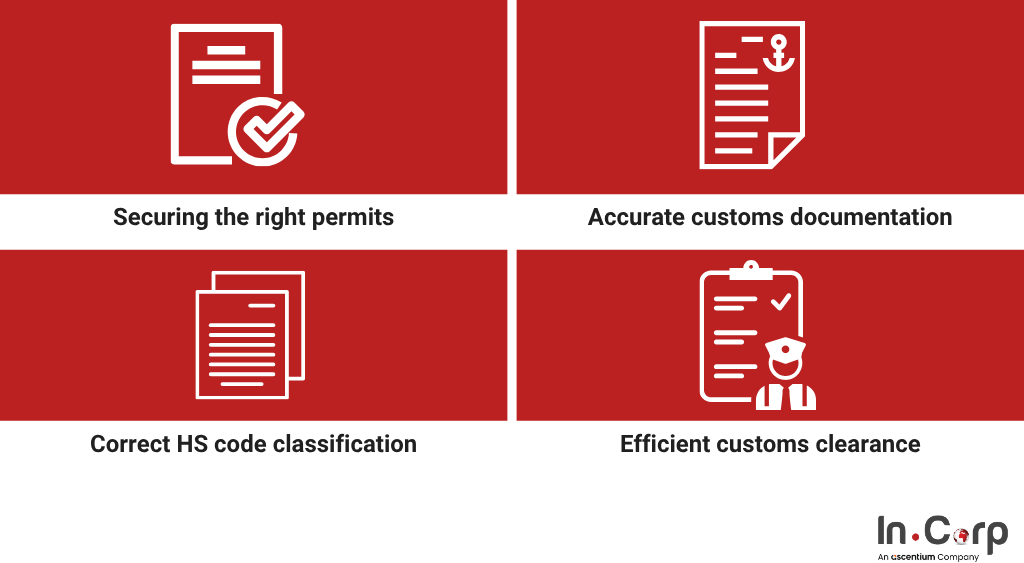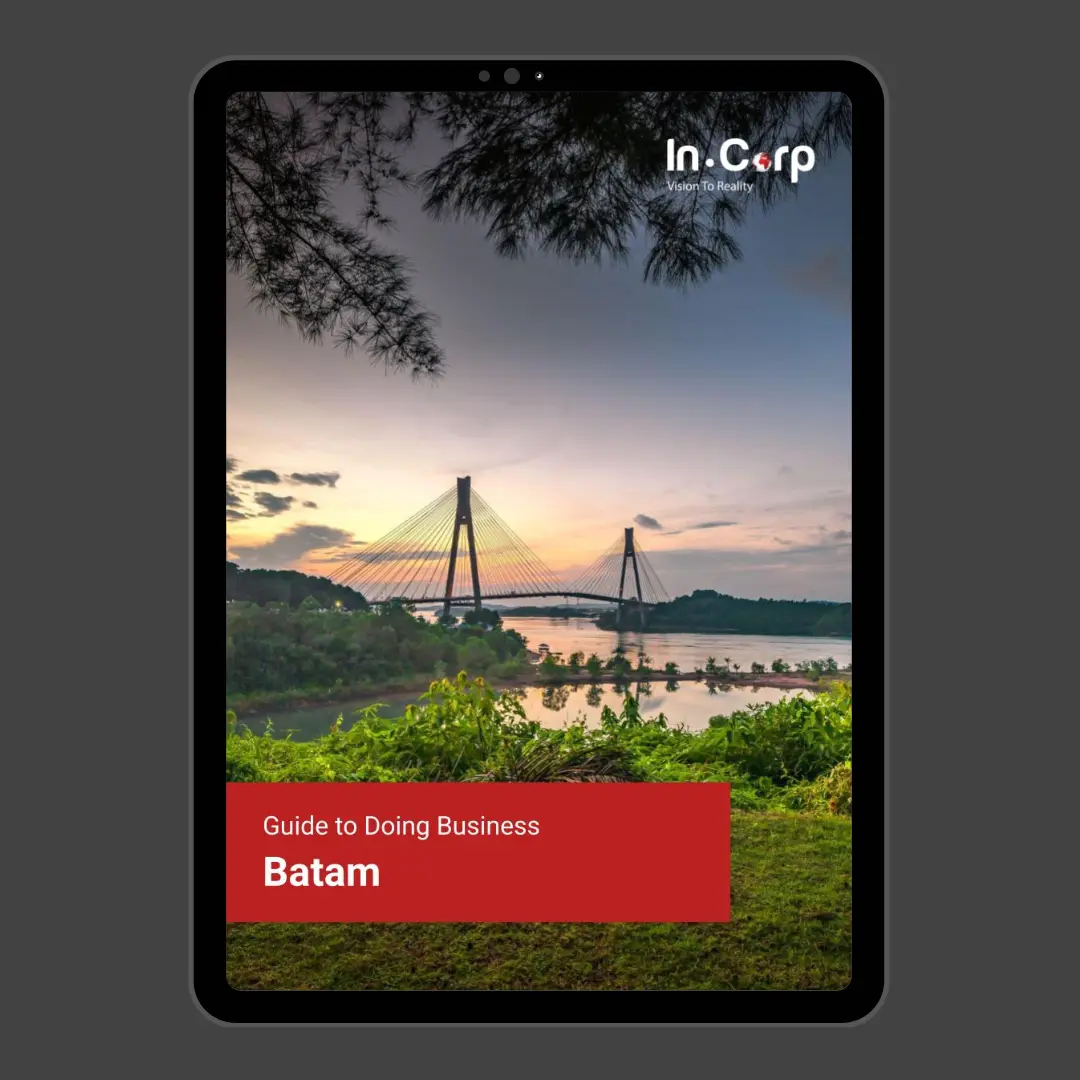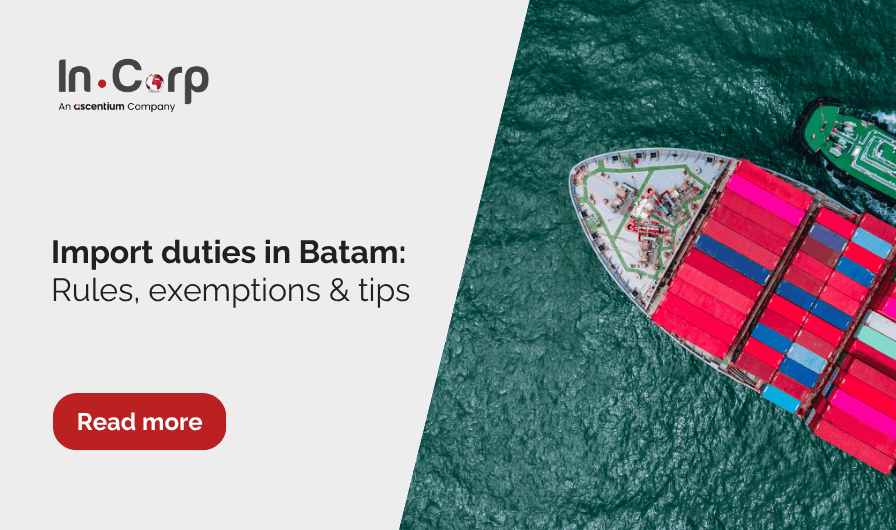Import duties in Batam operate uniquely within Indonesia. As part of the Free Trade Zone (FTZ), Batam offers businesses distinct tax and customs benefits. Many goods brought into Batam are exempt from import duties, VAT, and other taxes, making it an enticing place for importing and trading.
This article explains how import duties apply in Batam, what goods are taxed or exempt, and how the customs process works.
Understanding import duties in Batam
For importers and manufacturers in Batam, import duties work differently from those of the rest of Indonesia. Batam is part of the Batam–Bintan–Karimun Free Trade Zone (FTZ), which was created to attract investment, reduce costs, and support export-driven industries.
- No import duties or VAT: Goods imported into Batam for industrial use, storage, or re-export are generally exempt from import duties, VAT, and income tax (PPh).
- Customs isolation: Legally, Batam is treated as outside Indonesia’s customs territory. This means goods entering Batam are not considered as having entered Indonesia until they are shipped out of the FTZ.
- Re-export flexibility: Businesses can import raw materials, process them in Batam, and export finished products without paying standard import taxes.
- Movement into Indonesia: If goods are shipped from Batam to other Indonesian regions, regular import duties and VAT will apply, and the process is treated as if the goods were entering Indonesia for the first time.
This unique status of Batam simplifies the customs process for businesses operating in Batam, as they can avoid the standard import duties and VAT that apply to goods entering other parts of Indonesia.
Business advantage for operating in Batam
Operating in Batam gives companies a cost-saving edge, especially if you:
- Import machinery, raw materials, or components for production.
- Manufacture products for export markets.
- Use Batam as a logistics or redistribution hub for Southeast Asia.
In short, Batam’s FTZ status allows businesses to lower costs, simplify customs, and stay competitive—as long as imports are managed within the FTZ framework.
Read more: Why should you invest in Batam Free Trade Zone
Current import duty regulations in Batam
PMK No. 4/2025 updates Indonesia’s import, VAT, and duty regulations. While it applies across Indonesia, Batam’s Free Trade Zone (FTZ) retains its exemptions under this regulation unless goods are moved from Batam into other Indonesian regions.
- FTZ exemptions: Goods imported into Batam for use within the FTZ (manufacturing, storage, or export) are still free from import duties, VAT (11%), and income tax (PPh).
- Domestic transfer rules: If goods are moved from Batam into other parts of Indonesia, they are treated as new imports, and regular import duties and taxes apply.
- Permit requirements (PPFTZ): Businesses must use the correct permits (such as PPFTZ-01 for raw materials and PPFTZ-03 for finished goods) to claim duty exemptions legally.
- Customs compliance: Proper documentation, including HS codes, invoices, and licenses, is mandatory. HS codes, also known as Harmonized System codes, classify goods for customs purposes.
Ensuring the correct HS code for your goods is crucial, as it determines the applicable import duties and taxes. Incomplete or incorrect paperwork may cause delays or loss of tax benefits.
Goods subject to import duties and exemptions in Batam
Not all goods are treated equally under Batam’s Free Trade Zone (FTZ) system. While many items can be imported duty-free, others are subject to restrictions or special rules. Knowing which category your goods fall into is critical for businesses to avoid unexpected costs.
Goods exempt from import duties in Batam
- Raw materials and components are used in manufacturing and export.
- Capital goods such as machinery, production equipment, and industrial tools.
- Intermediate goods that will be processed further before export.
- Consumer goods are for use within Batam as long as they remain in the FTZ.
Goods that may be subject to import duties or restrictions
- Alcoholic beverages and tobacco products – often taxed or restricted due to national regulations.
- Luxury goods (e.g., high-end cars, branded fashion items) – may still face duties or special taxes.
- Hazardous materials and chemicals require permits and may face strict controls.
- Goods moved from Batam to other Indonesian regions are treated as new imports into Indonesia, meaning import duties, VAT, and other taxes apply.
- Maximizing exemptions and keeping operations lean by aligning your imports with Batam’s FTZ policies.
Step-by-step process for importing goods in Batam

Even though Batam offers generous tax exemptions under its Free Trade Zone (FTZ) system, businesses must still follow a straightforward import process to enjoy these benefits. Here’s how it works for importers and manufacturers operating in Batam.
- Securing the correct permits to qualify for FTZ benefits.
- Preparing and submitting customs documents accurately.
- Ensuring the correct classification of goods under HS codes.
- Managing customs clearance timelines and avoiding unnecessary inspections.
While these steps may look simple on paper, they can be time-consuming and complicated.
Guide to Doing Business in Batam

Maximize your import potential in Batam with InCorp
To fully leverage Batam’s FTZ benefits while staying compliant, you need a trusted partner who understands the local trade environment. InCorp can assist you with our comprehensive import services, such as:
- HS code classification: Accurate product categorization to ensure the right duty and tax treatment.
- Duty and tax calculations: Clear, reliable cost breakdowns so you can confidently plan.
- Permits and licenses: Guidance in securing the necessary approvals for restricted or sensitive goods.
- Customs clearance: Smooth, efficient handling of your shipments to avoid delays at the border.
- Import restructuring: Strategic advice on how to optimize your supply chain within Batam’s FTZ framework.
Click the button below to benefit from Batam’s FTZ. Our experts are here to help you.
Frequently Asked Questions
How are import duties in Batam different from the rest of Indonesia?
Batam is part of a Free Trade Zone (FTZ), meaning most imported goods are exempt from import duties, VAT, and income tax as long as they stay within the FTZ.
Are all goods entering Batam free from import duties?
No. Raw materials, machinery, and goods for manufacturing or export are duty-free, but restricted items (like alcohol, tobacco, luxury goods, and hazardous materials) may still be taxed or require special permits.
What happens if goods from Batam are sent to other regions in Indonesia?
Goods moved from Batam to other Indonesian regions are treated as new imports, and regular import duties and VAT will apply.
Do businesses still need permits and documentation in Batam’s FTZ?
Yes. Companies must use the correct PPFTZ permits and provide proper customs documents, including HS codes, invoices, and licenses, to claim duty exemptions.
Why do companies choose Batam for importing and manufacturing?
Batam offers major cost savings, simplified customs procedures, and flexibility for re-export, making it ideal for manufacturing, logistics, and export-focused operations.
Get in touch with us.
What you'll get
A prompt response to your inquiry
Knowledge for doing business from local experts
Ongoing support for your business
Disclaimer
The information is provided by PT. Cekindo Business International (“InCorp Indonesia/ we”) for general purpose only and we make no representations or warranties of any kind.
We do not act as an authorized government or non-government provider for official documents and services, which is issued by the Government of the Republic of Indonesia or its appointed officials. We do not promote any official government document or services of the Government of the Republic of Indonesia, including but not limited to, business identifiers, health and welfare assistance programs and benefits, unclaimed tax rebate, electronic travel visa and authorization, passports in this website.



